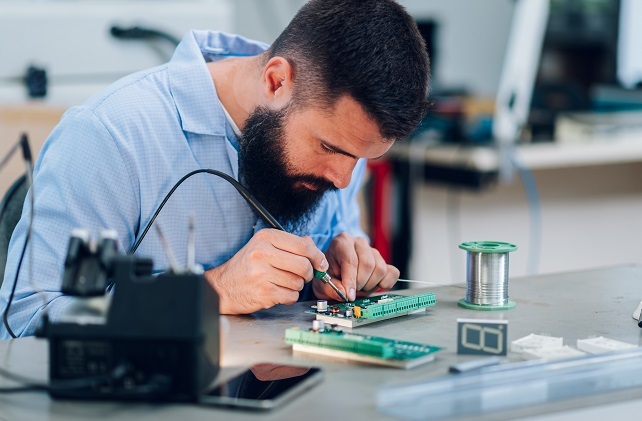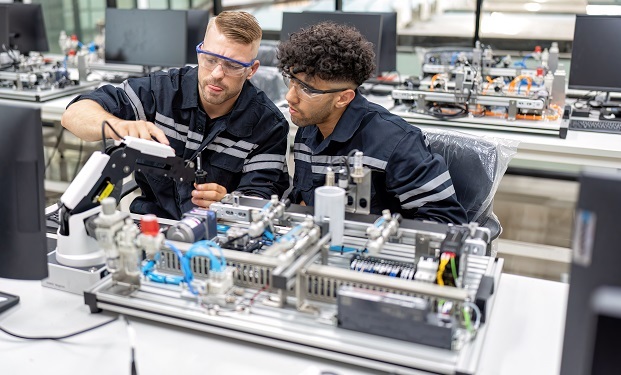
 Data Structure
Data Structure Networking
Networking RDBMS
RDBMS Operating System
Operating System Java
Java MS Excel
MS Excel iOS
iOS HTML
HTML CSS
CSS Android
Android Python
Python C Programming
C Programming C++
C++ C#
C# MongoDB
MongoDB MySQL
MySQL Javascript
Javascript PHP
PHPPhysics
Chemistry
Biology
Mathematics
English
Economics
Psychology
Social Studies
Fashion Studies
Legal Studies
- Selected Reading
- UPSC IAS Exams Notes
- Developer's Best Practices
- Questions and Answers
- Effective Resume Writing
- HR Interview Questions
- Computer Glossary
- Who is Who
What is the full form of EIE?
Signal Processing
Electronics and Instrumentation Engineering (EIE) is an essential part of signal processing which includes the control and analysis of signals to extricate valuable data or features. In EIE, signal processing procedures are utilized in different applications such as speech processing, image processing, control frameworks, communication frameworks, and numerous others.

The field of signal processing encompasses a wide range of methods including filtering, transformation, compression, highlight extraction, design recognition, and information analysis. These strategies are utilized to improve the quality of signals, remove commotion or interference, and extract valuable data from the signals.
Signal processing has various applications in different areas such as medical diagnosis, multimedia, robotics, and numerous others. It plays a vital role in the plan and development of progressed electronic frameworks and gadgets that require exact signal analysis and control.
Control Systems
Control Systems in Electronics and Instrumentation Engineering (EIE) deals with the study of different control frameworks utilized to regulate and control physical frameworks such as machinery, processes, and gadgets. It includes designing, analyzing, and implementing control frameworks to ensure that the output of a framework is in line with the desired input.

Control systems can be classified as open-loop control frameworks and closed-loop control systems, with closed-loop control systems being more common in practical applications. Control systems play a crucial part in different areas such as robotics, automation, aerospace, and fabricating. In EIE, students learn around different types of control frameworks, their applications, and various control framework design strategies methods strategies.
Microelectronics
Microelectronics is a branch of Electronics and Instrumentation Engineering (EIE) that deals with the plan and manufacture of microelectronic devices and coordinates circuits. It includes the utilize of materials such as silicon, germanium, and gallium arsenide to form electronic components and circuits that are little in estimate and can perform complex capacities. Microelectronics finds applications in different industries such as telecommunications, aerospace, defense, and healthcare. In EIE, understudies learn approximately the design, testing, and fabricating forms included in microelectronics, as well as the integration of these gadgets into larger frameworks for practical applications.
Biomedical Instrumentation
Biomedical instrumentation is a subfield of Electronics and Instrumentation Engineering (EIE) that deals with the plan, improvement, and use of electronic devices and instruments in the field of pharmaceutical and healthcare. It includes the integration of standards from engineering, physics, and biology to develop new devices and frameworks for monitoring and diagnosing various therapeutic conditions. Biomedical instrumentation incorporates devices such as electrocardiographs, blood glucose monitors, magnetic resonance imaging (MRI) machines, and ultrasound machines, among others. The field also includes the advancement of sensors, transducers, and other measurement frameworks that are utilized in medical research and clinical practice.
Conclusion
In conclusion, Electronics and Instrumentation Engineering (EIE) is an interdisciplinary field that deals with the plan, improvement, and usage of instrumentation systems utilized for a wide range of applications, including signal processing, control systems, microelectronics, and biomedical instrumentation. Signal processing plays a crucial part in EIE, allowing for the extraction of valuable data from different sorts of signals. Control systems guarantee the proper working of complex frameworks and processes. Microelectronics is an essential component of EIE, because it empowers the plan and creation of integrated circuits and other electronic devices.
FAQs
Q1. What are some of the EIE curriculum's foundational courses?
Ans: Electronic circuits, digital signal processing, control systems, microcontrollers, sensors and transducers, biomedical instrumentation, communication systems, and industrial automation are a few of the fundamental subjects covered in an EIE programme.
Q2. What abilities are necessary for success in EIE?
Ans: Strong communication skills, strong analytical and problem-solving skills, a love of technology and creativity, solid math and physics knowledge, familiarity with programming languages, and strong communication skills are all necessary for success in EIE.
Q3. How can I prepare for a career in EIE?
Ans: You can pursue a Bachelor's degree in Electronics and Instrumentation Engineering from a reputable university, take part in internships or research projects, and get programming language experience to prepare for a future in EIE.

